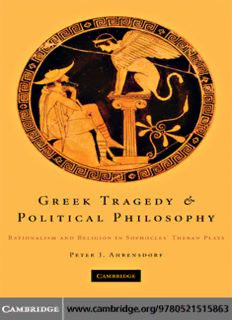
Greek tragedy political philosophy PDF
Preview Greek tragedy political philosophy
This page intentionally left blank GREEK TRAGEDY AND POLITICAL PHILOSOPHY Rationalism and Religion in Sophocles’ Theban Plays In Greek Tragedy and Political Philosophy, Peter J. Ahrensdorf examines Sophocles’ powerful analysis of a central question of political philosophy and a perennial question of political life: Should citizens and leaders governpoliticalsocietybythelightofunaidedhumanreasonorreligious faith? Through a fresh examination of Sophocles’ timeless masterpieces – Oedipus the Tyrant, Oedipus at Colonus, and Antigone – Ahrensdorf offers a sustained challenge to the prevailing view, championed by Nietzsche in his attack on Socratic rationalism, that Sophocles is an opponent of rationalism.AhrensdorfarguesthatSophoclesisagenuinelyphilosophical thinker and a rationalist, albeit one who advocates a cautious political rationalism. Such rationalism constitutes a middle way between an immoderate political rationalism that dismisses religion – exemplified by Oedipus the Tyrant – and a piety that rejects reason – exemplified by Oedipus at Colonus. Ahrensdorf concludes with an incisive analysis of Nietzsche, Socrates, and Aristotle on tragedy and philosophy. He argues, against Nietzsche, that the rationalism of Socrates and Aristotle incorporates a profound awareness of the tragic dimension of human existence and therefore resembles in fundamental ways the somber and humane rationalism of Sophocles. Peter J. Ahrensdorf is professor of political science and adjunct professor of classics at Davidson College. He is the author of The Death of Socrates andTheLifeofPhilosophy:AnInterpretationof“Phaedo”andtheco-authorof Justice Among Nations: On the Moral Basis of Power and Peace. GREEK TRAGEDY AND POLITICAL PHILOSOPHY Rationalism and Religion in Sophocles’ Theban Plays Peter J. Ahrensdorf Davidson College CAMBRIDGE UNIVERSITY PRESS Cambridge, New York, Melbourne, Madrid, Cape Town, Singapore, São Paulo Cambridge University Press The Edinburgh Building, Cambridge CB2 8RU, UK Published in the United States of America by Cambridge University Press, New York www.cambridge.org Information on this title: www.cambridge.org/9780521515863 © Peter J. Ahrensdorf 2009 This publication is in copyright. Subject to statutory exception and to the provision of relevant collective licensing agreements, no reproduction of any part may take place without the written permission of Cambridge University Press. First published in print format 2009 ISBN-13 978-0-511-50849-3 eBook (NetLibrary) ISBN-13 978-0-521-51586-3 hardback Cambridge University Press has no responsibility for the persistence or accuracy of urls for external or third-party internet websites referred to in this publication, and does not guarantee that any content on such websites is, or will remain, accurate or appropriate. To Alejandra Contents Acknowledgments page ix Introduction 1 1 Oedipus the Tyrant and the Limits of Political Rationalism 9 2 Blind Faith and Enlightened Statesmanship in Oedipus at Colonus 48 3 The Pious Heroism of Antigone 85 Conclusion: Nietzsche, Plato, and Aristotle on Philosophy and Tragedy 151 Bibliography 179 Index 187 vii
Description: